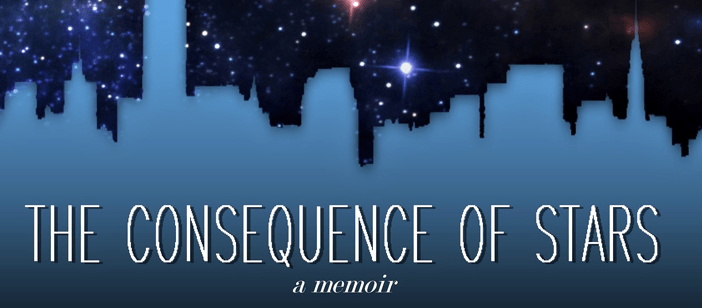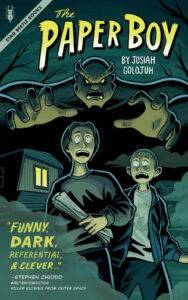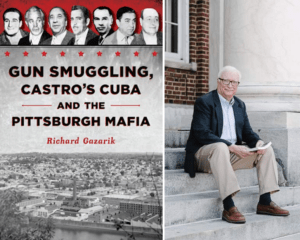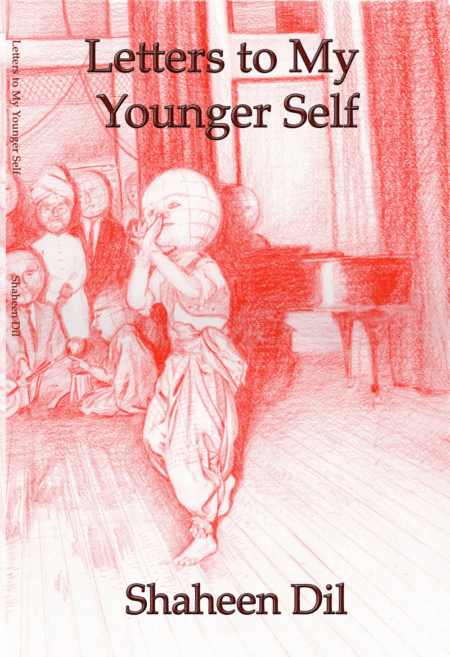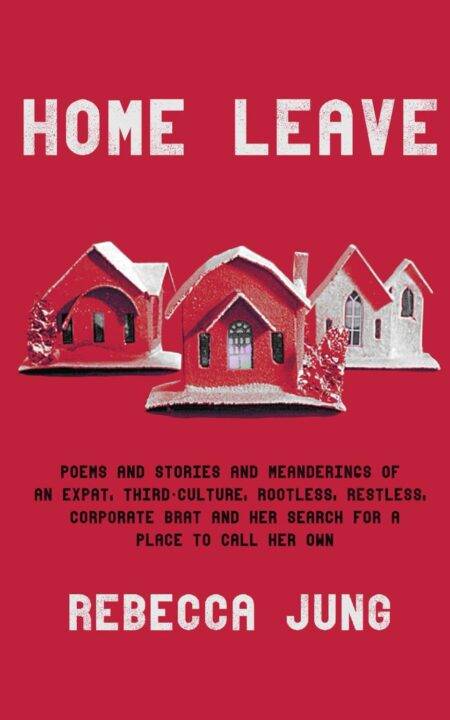From the publisher: “The Consequence of Stars is not a traditional memoir. Its center is not about dysfunction or overwhelming grief, but rather the story of searching. It is a memoir-in-essays about the longing for home, in all its meanings, an examination of a modern life that has forever been attempting to find balance and its place in the world.
In The Consequence of Stars, the author revisits his parents’ lifelong love affair with their hometown [of Pittsburgh]and one another despite life-threatening odds. He recalls a solo and revealing cross-country train ride and a spiritual awakening in the Navajo Nation, journeys representing his search. He plays guitar with Jack Kerouac groupies at the writer’s former Florida home, hunts for the ghost of Hemingway in the attic of his birthplace home, and sets out to build a Thoreau-like writer’s shed where he hopes to discover an artistic space, an artist’s home…”
About the Author: David W. Berner is an award-winning journalist, broadcaster, author, and associate professor at Columbia College Chicago.
His first book, Accidental Lessons (Strategic Publishing) was awarded the 2011 Royal Dragonfly Grand Prize for Literature. His memoir, October Song, won the Royal Dragonfly Award in 2017. His second memoir, Any Road Will Take You There (Dream of Things Publishing) won the 2013 Book of the Year Award from the Chicago Writer’s Association for Indie nonfiction and was short-listed for the Eric Hoffer Grand Prize. The Chicago Book Review named his collection of essays, There’s a Hamster in the Dashboard, a “Book of the Year” in 2015. David has been published in a number of literary magazines, online journals, and in Clef Notes Chicagoland Journal for the Arts. He also writes a blog on the creative process at www.constantstory.com and another on his regular walks with his dog at www.walkswithsam.com.
In 2011, David was named the Jack Kerouac Writer-in-Residence at the Jack Kerouac Project. He lived and worked in Kerouac’s historic home in Orlando, Florida for three months. In 2015, David was named the Writer-in-Residence at the Ernest Hemingway Birthplace Home in Oak Park, IL.
David is also a radio journalist, reporting and anchor for Chicago’s WBBM Newsradio and a regular contributor to the CBS Radio Network. David’s audio documentaries have been heard on public radio stations across America.
David grew up in Pittsburgh but now lives with his wife outside Chicago where he plays guitar and cares for his dog, Sam.
The Street Where You Live
 It was not the first time my father’s nose had been bloodied.
It was not the first time my father’s nose had been bloodied.
The punch was a surprise left jab from Frankie, a kid built like a St. Bernard. He lived just around the corner and was a regular on Friday nights when Dad’s buddies got together to box in the basement of my father’s boyhood home, a red brick house at the bottom of the hill. My father and his friends—just barely teenagers—tied clothesline to the cellar’s pillars to form a big square, placed chairs in the corners of the uneven concrete floor, and used a saucepan and wooden spatula to bang out the beginning and end of each round. The boys had two sets of black leather boxing gloves, cracked from age, and they’d tie them up on their fists and beat the crap out of each other. There was nearly always blood from a split lip, frequent scratches, and maybe a drop of plasma from a nostril. But my father had never been hit this squarely in the face, and this time there was a stream of red running from Dad’s nose and into his mouth.
Dad often told this story or stories like it—stories about his boxing days—usually a tale about a fight with Frankie and all the wild and violent punches. He would go on about how Frankie wanted to stop the fight but how Dad wanted to keep swinging.
With blood on his face, Dad raised his gloves again and Frankie raised his. Dad threw a right, and Frankie ducked. Frankie tried an uppercut but missed. My father swiveled to his left and, falling away, landed a left to Frankie’s ear, momentarily knocking him off balance. Dad threw a quick right and struck Frankie’s jaw. The punch threw him to the floor. Standing above him, my father wiped away blood from his nose with one of the gloves and then tapped his gloves together and began to rock back and forth.
Frankie looked up from the floor. “I’m done. No more,” he said.
Another boy banged the spatula on the pan. The match was over.
Most of his friends knew my father could throw a good punch, but what they didn’t know about was his other, less masculine, talent. Art wasn’t something he liked to talk about. Only one of Dad’s schoolteachers and his mother were truly aware of his natural ability. He never took a lesson. Dad drew from the heart. He once used a simple No. 2 pencil to sketch pheasants and deer on the walls of his bedroom, and his mother, for years afterward, carefully painted around the drawings whenever she freshened up the room with a new coat. On butcher paper from the meat market, Dad drew charcoal portraits of boxers, some in profile, others in the ring, gloves in the air. His buddies knew about the drawings, but Dad never admitted they were his. “They’re my brother’s,” he’d tell his friends. “He thinks he’s going to be a Rembrandt.” Dad’s friends would pretend to know who Rembrandt was.
After the boys were done boxing in the basement, Dad and his cronies came upstairs to listen to the matches broadcast on the Gillette Cavalcade of Sports. While the city choked on the soot and grime of the steel mills, and men wheezed their way into the taprooms to listen to the same live broadcast, the boys took their seats in front of the big console radio in the living room. My father’s favorite, Billy Conn, the Pittsburgh Kid, was not fighting that night, but Dad wished he had been. Conn was his hero, the Irishman with the chiseled Hollywood face, the lightweight champ who took on the great Joe Louis, head strong and battling through to the 13th round, smelling salts propping him up. Conn had the tenacity to believe he could beat anyone, and my father believed Conn was Superman. Conn did not win his match with Louis, but that didn’t matter. It was his resolve, his doggedness that attracted my father and so many others in the brawny steel town. Conn had only been knocked down twice in his career. He was a man who even when he wobbled, found a way to square up and return to deliver a hard left hand to his opponent.
“Who’s fighting tonight?” asked one of Dad’s friends.
“Montgomery,” Dad said in his now nasally voice. He had a ball of toilet paper stuck up his nose to ease what was left of the bleeding.
“He up against Beau Jack?” another asked.
Montgomery was a Pennsylvania guy. But Jack was the favorite in this match. Montgomery had beaten Jack once before. However, in a rematch, Jack had knocked him out.
“I’m for Monty,” my father said. “He’s got more guts.”
“Yeah, but Jack is the greatest lightweight ever,” one of the friends said.
“Everyone loses sooner or later,” Dad said, taking the crimson colored tissue from his nostril, wiping his forearm across his nose, and sniffling back clotted blood.
My father lived in the last house on the street before the woods took over. Sometimes he and his older brother would hunt in those woods, shooting rabbits, birds, and squirrels with a BB gun or .22 rifle. They lived with their mother and aunt, his mother’s older sister. Their father had left two years before, not long after Dad started boxing in the basement. His father walked to his car one morning and drove away. There had been arguments with his mother, and there were rumors of an affair with the neighbor lady, the mother of one of my father’s one-time boxing buddies. The two boys never talked about it, even though others did. There were times Dad and his friend had found each other in the ring together, but when Dad’s father left for good, as the story goes, the friend never returned, never boxed in the basement again.
The radio crackled. The announcers bellowed. The boys fell silent and stared at the speaker, hypnotized. For the next hour, Dad lay on the floor on his belly, his elbows resting his hands to his chin, imagining the punches, the sweat and the blood. He loved the art of the fight, the controlled violence. For him there was glory and beauty in the battle. The combination was comforting. For a fourteen-year-old boy who would soon be asked to become a man, to save his fatherless family, to carry the load, comfort was to be savored, even if it was draped in ferocity and flying fists, even if the fights to come might be bloodier than any of the basement boxing matches.
There was a photo album in the drawer of the dresser next to his mother’s bed. In one picture my father is standing with a fishing rod next to his father. Dad is about six years old. He’s smiling and squinting into the sun. His father is dressed in a white tee shirt, stand stiff and straight, a cigarette dangling from the corner of his mouth. On the opposite page of the album is another photo. It’s around the same time, same age. My father is shirtless, wearing only shorts. He’s looking into the camera; his fists are in the defensive pose of a boxer, up around his face. He’s scowling.
“Which picture is the real you?” his mother once asked.
“Both,” Dad said.
After Dad’s father left, his mother didn’t look at the album much.
“Don’t you wish we could see this fight?” Frankie asked as the voices on the radio proclaimed the winner of the match: Montgomery in the 10th. “Even just some pictures.”
“The Millers have a television,” Dad said. “But I don’t think they show the fights.”
“Let’s take our own,” Frankie said.
My father ran to get the family camera from the cabinet in the hallway. He fiddled with the knobs, uncertain if there was film inside.
“You remember how to work it?” Frankie asked.
Dad was unsure.
“See if you can get it going,” Frankie said. “I’ll be Jack. You be Montgomery.”
After a few minutes, Dad was certain he’d figured out the camera. He showed another one of the friends how to look through the viewfinder, where to push the button.
Frankie ran to the basement to get the gloves. He slipped one pair on as he threw the other pair to my father. The boys stood close and put up their dukes. Frankie sneered, and Dad showed his teeth, snarling like an alley dog.
“Point the camera,” Dad said through his teeth. “Take it.”
Shhclick.
Dad snatched the camera from his friend and advanced the lever. “One more time,” he said.
My father and Frankie returned to their poses
Shhclick. Shhclick.
“When can you get the film developed?” Frankie asked
“I’ll have to ask my mom,” Dad said.
‘You think they really looked like that?” Frankie asked, considering the poses they struck.
“Of course they did,” Dad said. “Mean and nasty.”
“Like they wanted to beat the shit out of someone,” Frankie said.
“Shhh,” Dad sighed.
“Your mom can’t hear us in here,” Frankie said. “She’s in the kitchen, smoking.” The boys could smell the fresh lighting of a Parliament.
“Just don’t say that,” my father insisted, revealing the strictness of his Catholic upbringing.
Dad, his mother, and aunt attended mass at St. Sylvester’s Catholic Church every Sunday morning. His mother wore a bonnet and white gloves. His aunt carried an old, leather Jerusalem Bible. Dad wore a white shirt and black tie, tight and awkward around his heck. He remembered sitting on rigid wooden pews. No one at the services smiled. Church was not a place for happiness. His family was Irish. The Irish believed church was serious business.
“Shit, shit, shit, shit,” Frankie whispered.
The other boys giggled.
“Young men!” Dad’s mother hollered from the kitchen. “Getting a little rambunctious in there.”
My father glared at his friends.
“I think it’s time to head home,” his mother said.
“But all the fights aren’t over yet,” Dad pleaded.
His mother was now standing at the entranceway to the kitchen. “There will be other Friday nights.”
Dad turned off the radio and walked his buddies to the front door. It was sad to watch them go.
Three strays in one week.
The first was an old tabby cat with a knick out of its tail. Her father would have none of it, however, and tossed the cat from the second floor back porch over the railing and into the woods. “No damn cats,” he snapped. He tolerated my mother’s love of wayward animals, but he wasn’t about to allow any cats in his home. The second was a scrawny mutt with coarse gray and black hair covering its eyes. Mom’s father fed him some chicken parts in a soup dish on the kitchen floor, but the dog didn’t stick around and was gone the next morning. The third stray appeared to be a mix between a Boston bull terrier and a beagle, a combination doomed for awkwardness.
“He’ll do, if no one claims him,” her father said. “And that’s the only way it goes.”
“What if someone does want him back?” my mother asked.
“Then we give him back. What if it was your dog?”
“But I really like him.”
“He probably has a home somewhere,” her father said, sipping from a can of Duquesne beer, a hometown pilsner made at a brewery near the Monongahela River. “Still, he has no collar and no tag. We’ll see what your mother says.”
Mom stroked the dog’s back as it gnawed at what her father had offered it—chicken gristle and small pieces of fat.
“Hell, he probably hasn’t had anything that good in a long while,” her father said, taking another taste of beer.
My mother was unable to leave animals alone. Any dog or cat left alone on the streets was hers. Collars and tags did not matter. Ownership did not matter. She’d spot the animal on her walk from school, find herself petting it, and soon carrying it or calling it to follow her home. She thought of herself as a pied piper, a rescuer. But mostly it was a selfish act. She once had her own dog, a mix of spaniel and Labrador. Tippy was its name. It died of distemper.
“When he’s done here, put a leash on him, and walk him around the block,” her father insisted. “Let’s see if he’s lost.”
My mother nodded reluctantly. She’d been asked before to do this sort of thing.
Mom put the old leash—one that remained from the Tippy days—around the dog’s neck and twisted the long end through the clasp to secure it.
“Come on, Mickey,” she said.
“You’ve named him already?” her father asked.
My mother walked the dog through the small dining room and living area and out the door to the front porch. She stood on the top of the three cement steps heading toward the sidewalk.
“You got another one?” It was the question my mother remembered Jacqueline, her sister, asking. She was in the yard with a friend, making yellow bouquets from the dandelions in the lawn.
“Yep,” Gloria said.
Jacqueline had been just as much a dognapper as Gloria. One time she hid a beagle mix in the home’s coal cellar. She stuffed food from the dinner table under her shirt and snuck it to the dog until her mother heard its muffled bark. There was an unspoken competition between Gloria and Jacqueline. Which one could rescue the most strays?
“That’s not smart,” Jacqueline said, scolding her. “It’s someone else’s dog, you know? You shouldn’t have it. It’s not yours.” She, my mother thought, was repeating a lesson she had learned after her mother found the beagle.
“Maybe it is,” Gloria said. “Maybe no one wants him.”
My mother recalled Jacqueline giggling at this statement.
Mom guided the dog down the steps to the street. When the road dipped and curved, and she was out Jacqueline’s sight, she abandoned the sidewalk and turned to the woods along a dirt path toward a small stream. She sat behind a large wild cherry tree and held the dog close, eventually pulling it to her lap. My mother stayed there until she heard her father’s sharp whistle, calling her to come home for dinner.
Mom’s mother had made thinly cut pork chops, fried in ketchup and onions in an iron skillet, a frequent dish.
“Can we give him the bones?” Gloria asked.
“I don’t see why not,” her mother said.
“Dogs shouldn’t eat pork bones,” her father said. “Too soft. They splinter. They’ll choke.”
“We’ll find him something else,” her mother said.
“Did you walk him along Hazelhurst Street? On Willet Road, too?” her father asked.
My mother nodded.
“No takers?” her father asked.
Mom shook her head.
“You sure?”
“Uh huh.”
Jacqueline crossed her arms and leaned back in her chair. My mother recalled her sister’s accusatory words. “She didn’t walk him anywhere,” Jacqueline said. “She sat in the woods the whole time.”
“Jesus, Mary, and Joseph,” her father barked, pounding a fist on the table, his beer can wobbling, nearly tipping over. “What the hell are we going to do with you? Goddamn it!”
Her father stood from the table and pushed back his chair. “Where is the damn dog? I’ll do it myself.” He marched into the kitchen and found the dog resting on a pile of old towels Gloria had fashioned into a bed. Her father huffed, picked up the dog, and carried it in his arms, glaring at my mother. “You just can’t go around stealing dogs.” He snatched the keys to his Jeep from the small table in the entranceway and left, the wooden screen door slapping the doorjamb as he exited.
My mother’s home sat on the knoll where the street dipped down the hill, about a tenth of a mile from my father’s home. It too was brick, but Mom’s home was a two-flat, one floor on top of the other with a small basement. Her English grandmother, her father’s mother, complete with a heavy accent, lived upstairs. On the first floor, Mom shared a small bedroom with her sister. Her parents’ room was next to theirs. Her mother worked part time at the Hilton Hotel in the city, selling cigarettes and cigars. Her father drove a truck for the city’s biggest grocer, Kroger. When the government began rationing during the war, Mom’s father sometimes slipped a few extra pounds of butter in his Jeep. He knocked on neighbors’ doors and left butter boxes on their stoops. He did the same with bags of sugar.
Mom’s father returned without the dog. “It belongs to a family on Churchview Avenue,” he said, walking past his wife to the kitchen. “They don’t deserve him,” he added, opening the refrigerator to grab a beer. “I told them the dog needs to see a vet and that I’d be back for it if they didn’t do something about it.”
“Is it sick?” my mother asked.
“Dog’s got fleas, you saw that. And there’s a sore on its belly. I’m sure you saw that eye? It’s swollen and red,” he said, using an opener on the beer can.
Mom’s mother nodded toward the girls’ bedroom.
When my mother heard the knock on the door, she knew it was her father.
“The dog is back home,” he said, standing at the entrance to the bedroom.
“Okay.” Mom was on her bed, her head in a book.
“He seemed happy,” he said.
“I hope so,” Mom said, still not looking up.
Her father paused, placed the open beer can on a tall dresser, and moved closer. He placed a hand under her chin and tilted her head back so her eyes were on his. “You can’t save them all.”
“Okay,” she said.
“No more,” he said.
“No more, Daddy.”
This is how it was when Norman and Gloria were young. They lived among the rust and grit of a city cloaked in the haze of iron ore, where nearly everyone worked for industrialists named Mellon and Carnegie and Phipps and came home at the end of the day to tidy homes and cold beer. Hard work surrounded them. Pride was the city’s foundation. It was a tough town. No one backed down from anything. You did what was right. You did your job. You went to church. You helped your neighborhood. You defended principles, your family, and your home. Life was a Norman Rockwell painting in many ways. The narratives of those feel-good 1940s films were built from the realities of neighborhoods like this one. Steel built the city, and it built the people. Norman and Gloria would never work a day in a mill, but they were as strong and sturdy and true as the heavy beams that rolled out from the big plants by the rivers.
But Pittsburgh was not only a mill town, it was a city in the woods, nestled in Pennsylvania’s lower left hand corner, wrapped inside leafy hills and muddy rivers, the kind of land French and British explorers had found promising for trapping and timber, land they had stolen from Native Americans who had lived there as hunters and gatherers for centuries. That history was all around Norman and Gloria, but they were less like the frontiersmen who occupied the land or the laborers who worked for steel barons, and more like the Shawnee, the natives of Southwest Pennsylvania who lived by the rising and setting of the seasonal sun. Norman and Gloria, like those original Americans, lived in the quadrants of the day—morning, noon, afternoon, and night—often outside, often with their tribe of friends. Despite growing up in a neighborhood that sat only seven miles from the nearest steel mill, my parents in their young lives drew in the ancient air of another time. They lived with less steel and more earth and sky. It came naturally, like how they had found each other, without structure or intent. There were consequences to living in a city like Pittsburgh, the hard realities of a mill town. People tended to default to the patterns of fathers and mothers before them—live on the same streets, go to the same bakers, butchers, and churches. But in the sky above them were millions of stars, and one could wish upon them every night, giving Norman and Gloria a license to dream. He wanted to be an artist. She wanted to write books. In a steel town, however, dreaming was an impractical enterprise.
This excerpt of The Consequence of Stars is published here courtesy of the author and should not be reproduced without permission.


